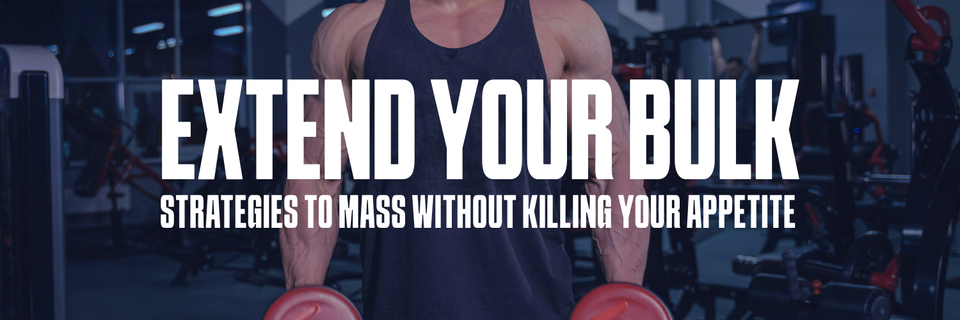How to Bulk Successfully: 3 Essential Strategies to Mass Without Killing Your Appetite

Are you struggling to keep your bulk because of eating that many calories? You're not alone. The biggest challenge most people face during a bulking phase isn't lifting heavier weights—it's consistently eating enough calories to support muscle growth.
The number one reason bulks fail is appetite - it disappears. When hunger goes missing in action, eating becomes gruelling and you start missing meals and falling short of caloric targets. This ultimately means your bulk is over.
The difference between a successful long-term bulk and one that stalls at 3,500 calories comes down to smart management. Which I do as such:
Strategy 1: Increase Calories Intelligently
Contrary to popular belief, huge caloric surpluses don't translate to greater muscle gains. Here's why:
Protein Synthesis Limitations: Your body can only synthesise muscle protein at a certain rate. Excess calories beyond this threshold don't enhance muscle building—they simply get stored as fat.
Appetite Suppression: Large increases in energy intake disrupt satiety and hunger hormones, leading to reduced appetite. Research shows this effect can persist even after overfeeding periods end.
Instead of the commonly recommended 500-calorie surplus, try:
- Smaller surpluses of 3-10% above maintenance
- Gradual increases over time
- Focus on sustainability over speed
Doing it this way:
- Helps you stay leaner throughout your bulk
- Reduces hunger suppression effects
- Allows for longer, more sustainable bulking phases
- Minimises fat gain which again, let's you mass for longer.
Strategy 2: Discipline
Many people assume bulking is easier than cutting because you get to eat more food. However, imho successful bulking actually requires significantly more discipline because you've got the calorie budget to eat more, and the mandate to eat more, but you can't eat whatever you want.
A Structured Approach is Essential: Your body thrives on regularity for optimal digestion, nutrient absorption, and hunger regulation.
Every Calorie Counts: Unlike during a cut when you're glycogen-depleted, surplus calories during a bulk are more likely to be stored as fat if not managed properly.
Irregular Eating Patterns Backfire: Constantly snacking or relying on junk food will suppress your appetite and lead to excessive fat gain.
To mass efficiently, you want to maintain structure during your bulk. This means:
- Stick to a meal plan or macro targets
- Maintain consistent meal timing
- Choose nutrient-dense foods over empty calories
- Track your intake and adjust gradually
- Avoid constant grazing throughout the day
Strategy 3: The Right Foods for the job
When bulking, your protein and fat intake typically remain stable, while carbohydrates become the main source of caloric increases. The secret to keeping the hunger alive lies in choosing carbohydrates that clear your digestive system quickly.
Foods to Minimise During Bulking
These foods can suppress appetite for future meals and are better applied on cuts or as special meals:
- Pasta, bread, and wheat products
- Potatoes
- High-fibre vegetables
- Berries and low-carb fruits
Appetite-Friendly Bulking Foods
These are my picks:

- Rice (and everything made with rice: Rice puffs, flour, crackers, cakes, noodles, etc.)
- Oats - They are a cut food, yes. But they're loaded with benefits and you can stack them easily to increase their energy density.
- Fruits (dense ones like bananas, mangos, dates, etc.)
- Dried fruits - they're small so you can eat lots mindlessly, plus they're snackable.
- Jams, juices, sports drinks, and sauces - they're usually laden with simple carbs and they're insignificant in terms of volume they take up in your gut.
Other Bulking Optimisation Tips
Make Your Food Enjoyable
Sustainability requires enjoyment. While you don't need hyper-palatable foods at every meal, your diet should bring you satisfaction. Use various sauces, seasonings, and flavour combinations to keep meals interesting while maintaining nutritional consistency.
Implement Strategic Meal Timing
Avoid Constant Eating: Continuous snacking suppresses hunger drive. Allow 3-4 hours between meals to let your digestive system clear and hunger to return.
Don't Overfill: Volume is your enemy during a bulk. Eat until comfortably full, not stuffed. If you need more calories, add them through calorie-dense additions like sauces, beverages, or additional small meals.
Eat your plants
Don't neglect fruits and vegetables during your bulk. A healthy gut is crucial for nutrient absorption and maintaining appetite. Incorporate plant matter through:
- Fruit smoothies
- Vegetable sauces
- Blended additions to meals
Stay Active
Physical activity naturally stimulates hunger. During your bulk, maintain:
- Daily step goals
- Light cardio sessions
- Regular resistance training
- Movement throughout the day
Wrap up
Successful bulking is not "eat more" it is more like "eat to support muscle growth while maintaining appetite and health" you can do that by:
- Gradually increasing caloric intake (3-10% surplus)
- Disciplined eating patterns and meal timing
- Smart food selection focused on fast-clearing carbohydrates
These will let you have longer, more effective bulking phases. And if you're already in a bit of a bind - reach out to chat on how to fix it.
Have you discovered any effective nutrition strategies for bulking? Let's hear them! Reply to this email.
